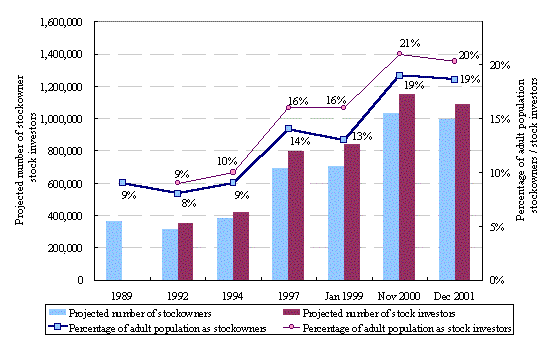A survey conducted by Hong Kong Exchanges and Clearing Limited (HKEx) in December 2001 revealed that retail participation in the Hong Kong stock market had remained stable while retail participation in the Hong Kong derivatives market had increased more than three times from a year ago. The survey found that:
-
20.3 per cent of Hong Kong adults (or 1,089,000 individuals) were stock investors who were currently holding or had traded stocks (including shares, warrants and Exchange Traded Funds) listed or traded on the HKEx market in the 12 months preceding the interview; the proportion was similar to the 21 per cent recorded as stock investors in 2000;
-
5.2 per cent (or 279,000) were derivatives investors who were currently holding or had traded derivative products (including futures and options) on the HKEx market in the 12 months preceding the interview; the proportion had increased substantially from 1.5 per cent in 2000;
-
20.6 per cent (or 1,102,000) were retail investors, who were either stock investors or derivatives investors.
A typical Hong Kong retail stock investor is a 42 year-old professional or manager, with upper-secondary or above education, with a monthly personal income of about $18,750. The median age of stock investors increased to 42 from 40 in 1999 and 37 in 2000. The median monthly personal income of stock investors also increased to $18,750 from $17,500 in 1999 and $16,250 in 2000.
Derivatives investors tended to be younger, compared with stock investors, and had higher personal incomes. Stock investors who also invested in HKEx derivative products (referred to as stock-and-derivatives investors) were more active traders - holding stocks for a shorter time period, trading more frequently - and were more aggressive in taking risks for higher returns.
Among stock investors, 18.6 per cent were new stock investors who had invested in Hong Kong stocks for the first time within the past two years. Over half of them entered the market through subscribing for shares in large-scale initial public offerings, such as MTRC (53 per cent).
Online traders who had traded stocks on HKEx through electronic media such as the Internet, either always or sometimes, made up 18.1 per cent of stock investors. Compared with stock investors, online traders comprised a larger proportion of males, were younger with higher education level, working status and personal income. Online traders had fewer years of experience in Hong Kong stock trading but were more active and more aggressive.
Compared with the findings of the previous full-scale survey in September 1997, the value of stock holdings and the transaction amounts were less, the period of stock holding was longer and trading was less frequent. The median stock portfolio size was $95,000, down one-third from $150,000 in 1997. The median deal size was $30,000, substantially lower than $50,000 in 1997. This was against the background of a drop of 24 per cent in the Hang Seng Index between September 1997 and December 2001 and a drop of 48 per cent in the average daily turnover value between 1997 and 2001. The median duration of stock holding increased to 18 months from four months in 1997. Also, the median number of transactions conducted by investors in the last 12 months dropped to three from 10 in 1997.
For intermediary services, 49 per cent of stock investors traded through banks only, up substantially from 30 per cent in 1997. However, 40 per cent of stock investors traded through brokerage firms only, down from 56 per cent in 1997. A much higher proportion of new stock investors (72 per cent) and online traders (58 per cent) traded through banks only.
Stock investors' perception of the Hong Kong stock market was generally positive. Most stock investors agreed that trading in the Hong Kong stock market was efficient (89 per cent), market information availability was good (72 per cent), there were sufficient high-quality listed companies available for investment (70 per cent) and regulation of brokers was effective (69 per cent).
The 2001 survey interviewed 2,394 individuals by telephone in two stages. The survey series is conducted roughly triennially by HKEx (formerly by the Stock Exchange of Hong Kong (SEHK), now a wholly-owned subsidiary of HKEx). The last full-scale survey was conducted in September 1997. In the intervening period, omnibus surveys were conducted annually to obtain basic statistics on retail participation.
A full report of the Retail Investor Survey 2001 is available on the HKEx website (http://www.hkex.com.hk/eng/stat/research/research.htm ).
Attached are selected findings of the survey presented in charts and tables.
Figure 1. Trend of stockownership and stock investment

Notes:
Stockowners: Individuals who were holding stocks (including shares, warrants and Exchange Traded Funds) on the HKEx securities market at the time of the interview.
Stock investors: Individuals who were holding or had traded stocks on the HKEx market in the 12 months preceding the interview.
Table 1. Types of stock investors